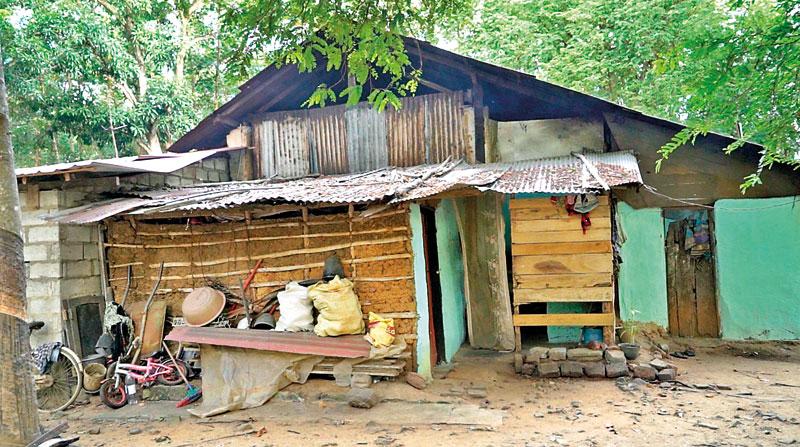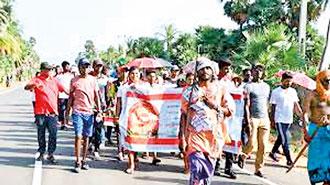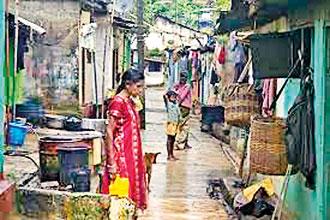19 Aug 2023 - {{hitsCtrl.values.hits}}

the Ibbagamuwa Divisional Secretariat of the Kurunegela district. Its entrance is about 3km from the Pangolla junction on the Dambulla – Kurunegela A6 road and is easily accessible by private vehicles, though public transport is limited. The Assistant Superintendent has claimed the estate is about 200 acres out of which rubber plantation is about 150 acres.
But when we visited the estate, we observed large areas of the estate are abandoned jungles and that the rubber plantation is not well maintained. The estate is owned by ten persons of two families who are based in Colombo. Deeds indicate the land is 281 acres, but workers claim some parts of it have been sold, which may explain the Assistant Superintendent’s claim it’s about 200 acres.
About 35 Malaiyaha Tamil families are living in the estate, though only 18 persons get work from the estate. They claim that they are about the 5th generation living in the estate, being descendants of the Malaiyaha Tamils brought by the British to Sri Lanka 200 years ago. Despite the proximity to the main road, we were shocked by the living conditions of workers, which are inhumane, degrading and in slave-like conditions.
The line rooms which consist of the accommodation are dilapidated. About 5-9 adults and children live in some line rooms, allowing no space for privacy and intimacy, with some family members being compelled to go out even when others are changing clothes. None of the workers have individual addresses and all letters are sent to the estate. This has caused delays in receiving letters and may have also led to the loss of some important correspondence. There is also confusion when letters are received from persons who have the same or similar names.
 HEALTH AND SANITATION
HEALTH AND SANITATION
There are only eight common toilets without running water and they are also dilapidated. Some toilets are very far from the line rooms, making them difficult to access at night or during rain. There are no bathrooms and bathing has to be in open or partially covered temporary basic structures. Often there is inadequate water in the wells and men, women and children used to go to the nearby river (Deduru Oya) for bathing. But as some parts of the estate with easy access to the river have been sold, they now have to walk about 5 kilometres to bathe in the river. There is no medical facility in the estate and they have to go to Pangolla or Rideegama hospitals, which are several kilometres away.
 ATTEMPTS TO GET HOUSING
ATTEMPTS TO GET HOUSING
On 16th February 2023, the Assistant Superintendent filed a complaint with the Gokarella police accusing 6 workers, including one woman, of cleaning parts of the estate. The workers in a statement to the police on 20th February 2023 had accepted they had cleaned parts of the estate and explained that the terrible living conditions and non-response of the estate management to their long-standing problems had compelled them to resort to this. Later, the owners of the estate filed a case in Kurungela District court (case 9361/L) accusing the same six workers of cleaning the estate without permission and harming cultivation. They had requested the court to issue interim orders to stop the cleaning, harming of cultivation and erection of any buildings. But no such order has been issued and the case is continuing, with the next date being 5th September 2023.
In the meantime, community members had put up fences demarcating about 20 perches (1/8th of an acre) for each family, in an unused area of the estate in front of the Hindu temple. The owners had refused to visit and meet the community for many years to discuss the problems faced by the community, but had suddenly rushed to the estate on 12th August 2023 and allegedly threatened the community they will not be given work in the estate and will be evicted from their line rooms if they do not remove the fences within three days.
The Estate Quarters Special Provisions Act no. 2 of 1971 specifically provides that workers have the right to stay in living quarters and enjoy all facilities together with dependents, even if employment is terminated, until and unless there is a court order to evict them. This act also provides that anyone found guilty of preventing, depriving or interfering with the above right could be imprisoned for up to six months.
The threats by the owners on 12th August coincided with the last day of the historic twoweek walk from Taleimannar to Matale by the Malaiyaha Tamil community to assert their rights, 200 years after they were brought by British to work in estates in slave-like conditions.
The demands by those marching included the right to land and housing, affirmative action on education, health and living wage, and decent work with legal protections, all of which are relevant to the Batalagoda estate. Most of those involved in the walk were from tea estates, but on 11th August, workers from the Batalagoda rubber estate also participated in the walk.
12th August was also the day the Minister of Estate Infrastructure, after a meeting with the President, made a public commitment for plantation communities to gain ownership of the land they have lived over generations, enhance education and ensure equitable government services.
A few days earlier, the UN Special Rapporteur on Contemporary Forms of Slavery, who had visited Sri Lanka in 2021, urged the government to ensure access to land, housing education and decent work for the Malaiyaha Tamil community.
This is indeed an opportune time for the Batalagoda estate community to demand and struggle for land, housing, and other facilities and resist and defy intimidation by owners, management and others. The owners have stated to the court that they will build new houses if space and facilities are inadequate, but this has not been done for decades and it is unlikely they will do so in the future. The community needs more support from politicians, state officials, lawyers, media and concerned Sri Lankans to continue their struggles for rights and dignity, in court and outside.
09 Jan 2025 2 hours ago
09 Jan 2025 4 hours ago
09 Jan 2025 6 hours ago
09 Jan 2025 7 hours ago
09 Jan 2025 7 hours ago